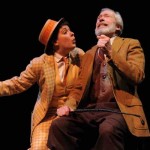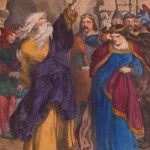Lear’s Folly Revealed
Act I, Scene IV
Loyal Kent: ‘Caius’
“you have that in your countenance
which I would fain call master.”
Kent follows Lear to Goneril’s castle, pretending to be Caius and after assuring Lear of his ‘plainspokenness’, Lear accepts him into his entourage. When Lear asks for his daughter to be told that he is at dinner, one of her servants (Oswald) replies rudely and abruptly, showing Lear the disrespect that Goneril instructed him to show. An altercation ensues when the servant returns, causing Lear to hit Oswald. Kent, disguised as Caius, intervenes, tripping Oswald and demanding that he show Lear the respect he deserves.
The Fool’s Advice
“Since my young lady’s going into France, sir, the
fool hath much pined away.”
When Lear repeatedly asks for the Fool, one of his knights reminds him of the uncomfortable truth that the Fool has become distant since Cordelia’s exile. This clearly makes Lear uncomfortable as he asks the knight to be quiet, having “noted it.” When the fool does reappear, he is full of joviality, but with a cutting sarcasm. While Lear enjoys the Fool’s company, the latter continually questions and provokes Lear on his recent behaviour:
 KING LEAR: “Dost thou call me fool, boy?”
KING LEAR: “Dost thou call me fool, boy?”
Fool: “All thy other titles thou hast given away; that
thou wast born with.”
…….
Fool:“I have used it, nuncle, ever since thou madest thy
daughters thy mothers: for when thou gavest them
the rod, and put’st down thine own breeches,”
The Fool’s constant sarcasm is echoed by Kent (in disguise), advising Lear that there is nothing foolish in what he says. Lear is agitated by the uncomfortable mockery that the Fool makes of Lear’s present situation.
Goneril’s Betrayal
 When Goneril enters, Goneril responds to Lear’s greeting by telling him that he entourage of knights have become a problem and are creating chaos in her castle:
When Goneril enters, Goneril responds to Lear’s greeting by telling him that he entourage of knights have become a problem and are creating chaos in her castle:
“But other of your insolent retinue
Do hourly carp and quarrel; breaking forth
In rank and not-to-be endured riots.”
Goneril goes on, demanding that Lear send half his knight away. Lear is apoplectic with anger and disbelief, cursing Goneril and refusing to compromise:
“Darkness and devils!
Saddle my horses; call my train together:
Degenerate bastard! I’ll not trouble thee.
Yet have I left a daughter.”
All the while, the Fool provides a telling narrative to the disenfranchisement of a once-powerful king:
“The hedge-sparrow fed the cuckoo so long,
That it’s had it head bit off by it young.”
Lear curses Goneril, questioning her husband Albany when he enters and in a fit of rage, calls his entourage to leave for Regan’s home, unaware of the conspiracy between the two sisters. Lear is aware that he is badly shaken by Goneril’s betrayal and disrespect, and bemoans the worthlessness of his tears for a daughter like Goneril. He believes that his rage and extreme reactions to Goneril are only a temporary crisis, promising Goneril a swift revenge by his last daughter, Regan:
“Suspend thy purpose, if thou didst intend
To make this creature fruitful!
Into her womb convey sterility!”
……….
“Life and death! I am ashamed
That thou hast power to shake my manhood thus;
That these hot tears, which break from me perforce,
Should make thee worth them.”
………..
“Yea, it is come to this?
Let is be so: yet have I left a daughter,
Who, I am sure, is kind and comfortable:
When she shall hear this of thee, with her nails
She’ll flay thy wolvish visage. Thou shalt find
That I’ll resume the shape which thou dost think
I have cast off for ever: thou shalt,
I warrant thee.”
When Lear, his knights and attendants have left, Goneril calls on Oswald to hurry to Regan to tell him what has happened and to ensure she does not keep him. Goneril bgins to show the depth of her cunning and ambition, encouraging Oswald to embellish the story as he sees fit. Even Albany, her husband, seems taken aback at her duplicity and cruelty to Lear:
“How far your eyes may pierce I can not tell:
Striving to better, oft we mar what’s well.”
